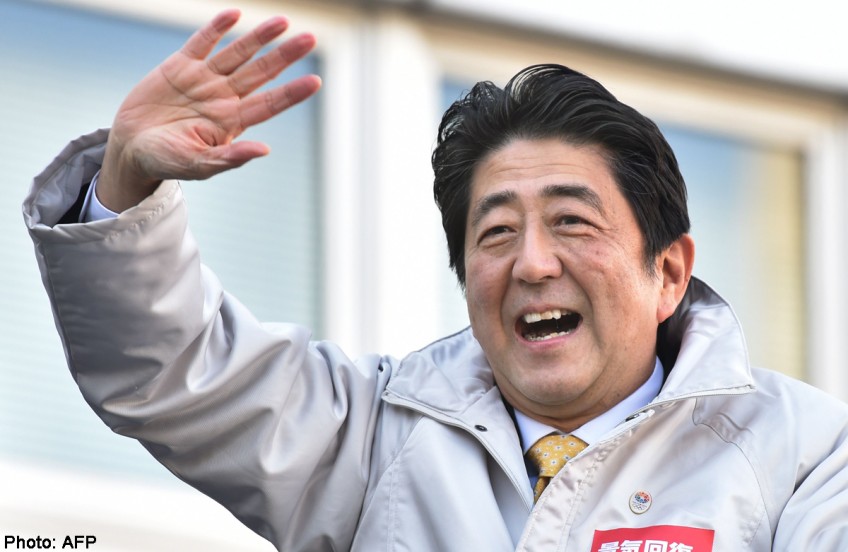PM Abe's party headed for landslide victory in general election: Polls

TOKYO - Public opinion polls in Japan have shown Prime Minister Shinzo Abe's Liberal Democratic Party (LDP) is headed for a landslide victory in the upcoming general election on Sunday (Dec 14).
The ruling party is ready to gain more than 300 of the 475 seats up for grabs in the Lower House of Parliament. But the dominance of the ruling party is also a reflection of the poor state of the country's opposition.
The Democratic Party of Japan's (DPJ's) first and only election victory was back in 2009 and it ruled for just three years. That time was defined by leadership instability - as a result, Japan had three different prime ministers during the party's tenure in office.
Its first leader Yukio Hatoyama promised Okinawa the impossible relocation of US marines off the island. His successor Naoto Kan was embroiled in events surrounding the Fukushima nuclear meltdown following the massive earthquake and tsunami. He was proceeded quickly by Yoshihiko Noda, under whom relations with China soured to the lowest levels since World War Two.
The party faced a devastating defeat in the general election in December 2012 to the Shinzo Abe led LDP, and has barely recovered. Public disappointment with the DPJ was also reflected in the Upper House election last year. Yet the party remains confident it can claw back some ground.
Banri Kaieda, president of the Democratic Party of Japan, said: "Compared with last year's Upper House election, there are more people ... stopping by to listen to us. There are many telling us to become an equal match to compete against Mr Abe."
Jun Iio, professor of government at the National Graduate Institute for Policy Studies, said: "DPJ will regain some seats, but they expect the increase to be limited. Now they have 62 seats. Probably they'll get 70 to 80 easily, but they won't get over 100."
The DJP has hardly rebuilt itself in the years since losing office, but it has reached out to smaller opposition parties. One of them is the Japan Innovation Party formed this year from a merger of three parties.
Mito Kakizawa, chairman of Policy Council and candidate of Japan Innovation Party, said: "In the last Lower House election, I had a bitter experience. We have decided to avoid overlapping where we can and unify our act. Such a natural force worked this time."
He is not the only opposition party with lofty ambitions. The Japan Communist Party may just be a minor party at present with just eight Lower House seats. However, it gained momentum last year during the Tokyo assembly election and doubled its seats there, and its candidates are hoping to ride that momentum on Sunday.
Akira Kasai, Japan Communist Party candidate, said: "Everywhere I go, many people tell me, next the Communist Party will come. On the issues of a sales tax hike, a nation building to go to war, the restart of nuclear power plants, construction of a new military base in Okinawa, there's anger among the general public. "
But the number of seats the DPJ and the Communist Party are likely to gain is expected to be too small to make any dent in PM Abe's mandate.